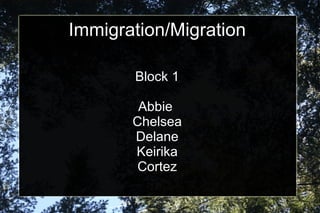
Immigration/Migration
- 1. Immigration/Migration Block 1 Abbie Chelsea Delane Keirika Cortez
- 3. the Anglo-Saxons must have been aware of the withdrawal of the Roman Army and the collapse of the economy. The time was right for a takeover.
- 4. devastating epidemics such as plagues which reduced the population in parts of Britain and a worsening of the climate in Northern Europe.
- 5. There is some evidence of Romano-British survival in agricultural practices with the cultivation of spelt wheat at West Stow. Some of the Romano-British people were assimilated into Anglo-Saxon society as slaves.
- 7. we can see examples of the pottery with deep furrowed grooves on the shoulder like those from the Anglian homelands and from cemeteries in Norfolk; sharply angled pots with facets cut out, like those from the Saxon regions of the Elbe Weser area in North West Germany. West Stow clearly does not represent straight migration of a single settlement but is part of a movement of peoples. It seems unlikely that all the Anglo-Saxon people on the continent had boats that could bring families, and possibly animals across the North Sea. Is it possible that some enterprising group ran a profitable business running settlers across from the Hook of Holland to Harwich?
- 9. * "When Britain gained "independence" from Rome in the year 410ce, the Roman legions withdrew leaving the country vulnerable to invaders. Soon after the withdrawal of Roman troops, inhabitants from the north began attacking the Britons."
- 10. * "a man named Hengest arrived on the shores of Britain with "3 keels" of warriors in 450ce. This event is known in Latin as the "adventus Saxonum," or the coming of the Saxons."
- 12. Angles: - the Angles were a group of Germanic people that invaded Britain after the Romans were pushed out. - they were pagan, worshiped a goddess named Nerthus. - they are believed to have lived on the Jutland peninsula (Denmark) . this is traced back to Danish legend about events in that area and related to the worship of the goddess Nerthus
- 17. There are records of Germanic infiltration into Britain that date before the collapse of the Roman Empire.It is believed that the earliest Germanic visitors were eight cohorts of Batavians attached to the 14th Legion in the original invasion force under Aulus Plautius in AD 43.
- 18. The early Anglo-Saxon society was organized around clans or tribes and was centered around a system of reciprocity called comitatus. The eoldorman expected martial service and loyalty from his thanes, and the thanes expected protection and rewards from the lord. By the middle of the ninth century the royal family of Wessex was universally recognized as the English royal family and held a hereditary right to rule. Succession to the throne was not guaranteed as the witan, or council of leaders, had the right to choose the best successor from the members of the royal house.ed to the position of thane or eolderman.
- 19. * The Middle Class - The middle class was divided into three main classes of freemen, also known as ceorls: The geneatas, a peasant aristocracy who paid rent to their overlord, the kotsetlas, and the geburs, or lower middle class. All ceorls had the right and duty to serve in the fyrd, which was the Anglo-Saxon military. Ceorls won promotion through economic prosperity or military service. If a ceorl possessed five hides of land, he became entitled to the rights of a thane, but could not be elevat